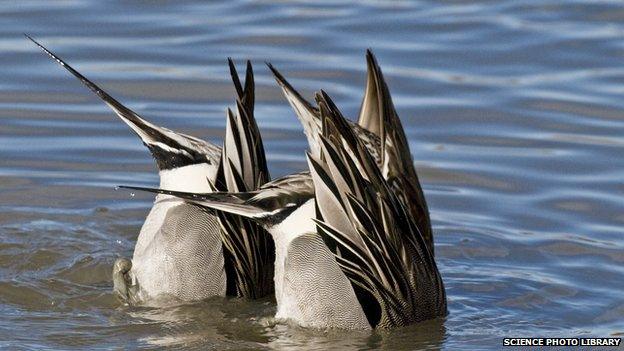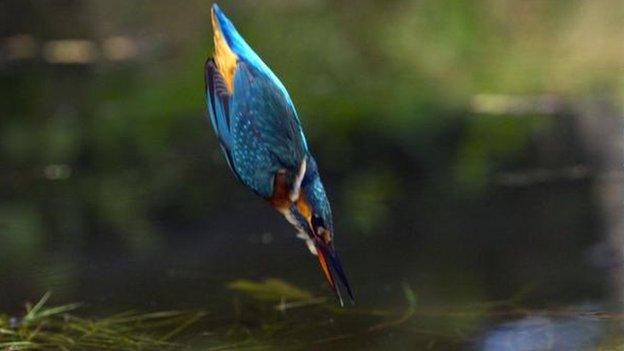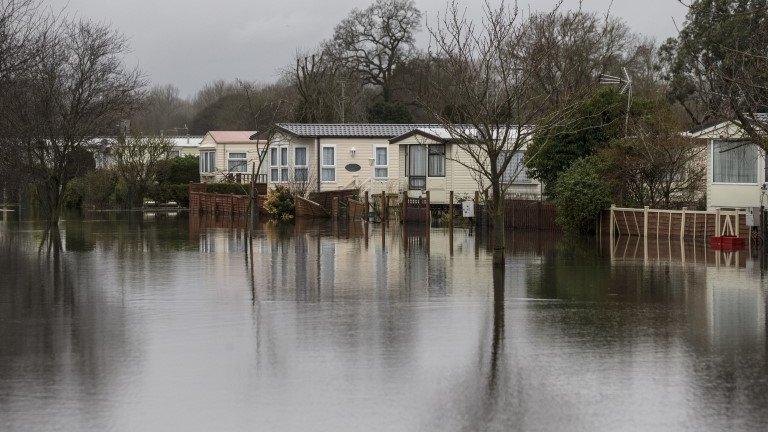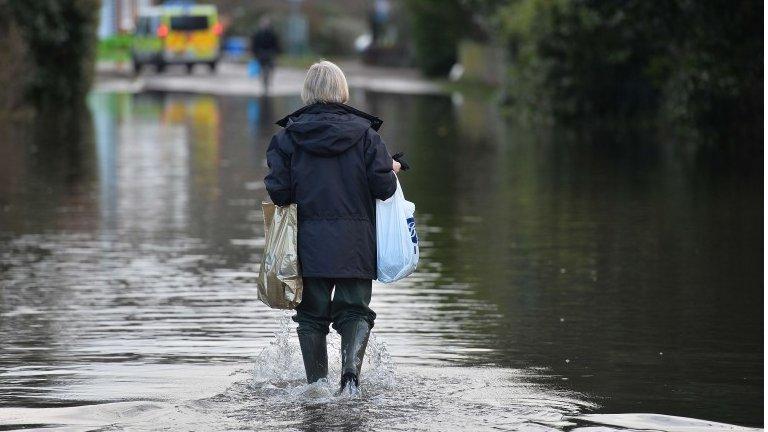Dabbling ducks struggling in floods
- Published
- comments

Pintails feed by dabbling
Wildlife organisations are being very careful in assessing the impacts of the recent flooding on species and the environment.
"We are not saying this is a disaster or this is something where wildlife has really suffered," Grahame Madge from the RSPB told me, keenly aware that when people's lives and homes are being threatened by rising waters, concerns about animal life comes a distant second.
Certainly the December storms and tidal surges had potentially very serious implications for many coastal habitats and species.
A report drawn up by Natural England showed that over 40 Sites of Special Scientific Interest (SSSIs) in England had been affected.
However, the impact of the unprecedented downpours on the Somerset Levels, the Thames and the Severn is much harder to gauge.
Birds and animals should in many cases be able to move away from relatively slow rising river floods, unlike tidal surges.
Good weather for ducks?
However, there are worries about some small mammals, particularly hedgehogs, who are hibernating at this time of year. The RSPB expects that many of those caught in flooded areas will drown.
Dabbling ducks will also face problems.
These are water birds that love to stick their bottoms in the air as they up-end in the shallow reaches searching for food.
Mallards, teals and pintails are common on the Somerset Levels but according to Grahame Madge, the floods will have made it difficult for them to feed.
"These are a group of ducks that take food from the few inches at the top of the water column, when it is too deep beyond their dabbling ability they have to move on to other sites," he said.
The RSPB suspects that many of these ducks have moved on to other, more inaccessible sites in the Levels but the floods are making it very difficult for their counters to get out and make certain.

Silt is a problem for kingfishers
Another bird struggling in the ongoing wet conditions is the Kingfisher. You might be forgiven for thinking that with all the water about, these fish loving brightly coloured fellows would be in their element.
Sadly, that would be short-sighted.
"They suffer when you get a high silt load in the water as they can't see to fish," said Grahame Madge.
"Temperature wise it is probably ideal for them, but when you get these brown rivers they can't see to fish, I would suspect that some kingfishers would be facing a really hard time at present."
Poisoned land
There have been some concerns that the massive amount of flooding now being seen across farmland may pick up and concentrate agricultural fertilisers, leading to a poisoning of the water and the land.
"The thing is that maybe smaller floods are worse for over-enrichment," said Tim Collins, from Natural England.
"What we are getting here is massive dilution, so it may be that the stuff that might have been deposited with smaller inundations may actually be dissolved and washed away - we simply can't tell yet."
There have also been suggestions from animal welfare campaigners that other species, including badgers, may be threatened by the duration of the floods.
They argue that animals that have been subjected to a pilot culling trial in Somerset may now be facing a more natural threat.
"Some setts will almost certainly have been damaged or flooded out completely, meaning that whole badger families could be disturbed," said Mark Jones from Humane Society International.
"There will be cubs in those setts right now and it's possible that some cubs will have drowned too."
The scale and extent of the impact of flooding on species like badgers has still to be determined.
According to Tim Collins from Natural England, flooding is part of the way that natural systems work and wildlife generally can cope.
"From an ecological perspective, mortality is a natural occurrence and not something we should be unduly disturbed about at a species level."
What is certain is that there has been plenty of damage being done to conservation infrastructure such as smashed up bird watching hides, footpaths washed away and visitor centres being flooded.
The Lincolnshire Wildlife Trust suffered badly as a result of the December surges, external, and are now looking at £1m insurance claim for damages to paths, hides and buildings.
"At Gibraltar Point which is one of our most popular nature reserves, we're not going to have a visitor centre there for a significant time because it needs complete rebuilding," said Rachel Shaw with the Trust.
"People can still go bird watching but it changes the whole nature of that place as a nature reserve."
It will take some time for the waters to recede, but it will take longer for a full assessment of the true cost of flooding on wildlife and the environment.
Follow Matt on Twitter @mattmcgrathbbc, external.
- Published17 January 2014
- Published17 February 2014

- Published14 February 2014
